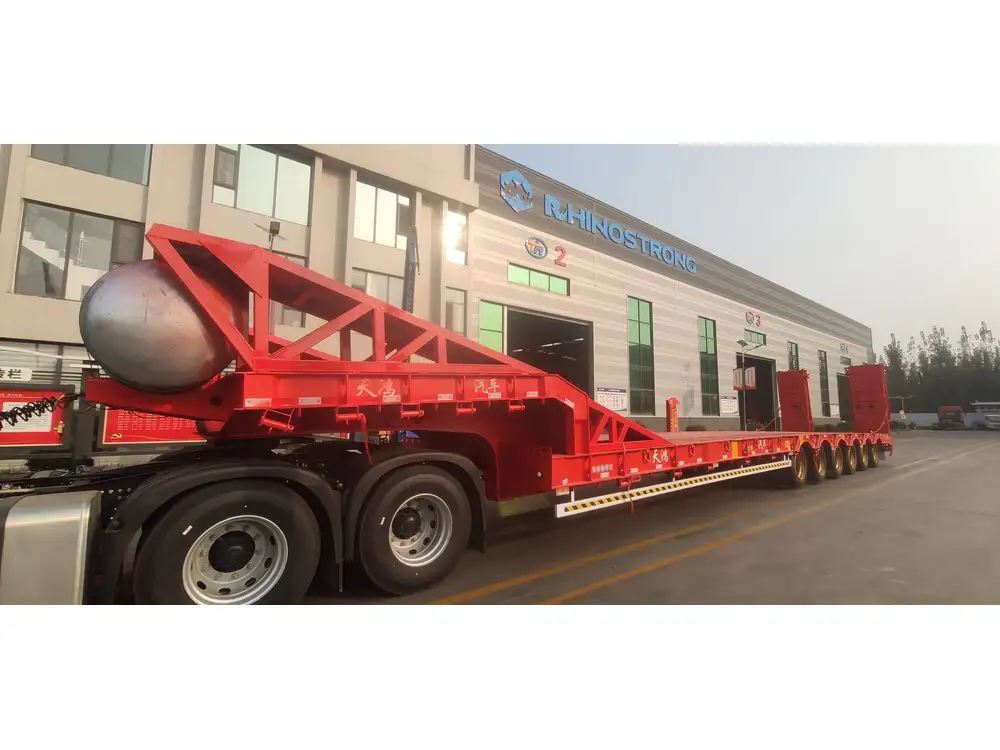Introduction to Skeletal Trailers
Skeletal trailers are crucial in the logistics and transportation sectors, valued for their versatility and efficiency in hauling containers. These trailers are often used to transport shipping containers and are designed to facilitate quick loading and unloading processes. Understanding the intricacies of skeletal trailers enhances their value in logistics operations, thereby improving overall transportation efficiency.
What is a Skeletal Trailer?
A skeletal trailer is a specialized transportation unit engineered to carry intermodal containers or freight containers of varying sizes. Constructed of robust materials, these trailers typically showcase a unique skeletal structure that allows easy loading and unloading. Their design is particularly optimized for transporting standardized containers, making them indispensable in intermodal shipping operations.

Key Features of Skeletal Trailers
| Feature | Description |
|---|---|
| Lightweight Design | Constructed using high-strength materials, skeletal trailers minimize weight without compromising structural integrity, allowing for a higher payload capacity. |
| Versatility | Capable of handling containers of various sizes (20ft, 40ft, etc.), making them suitable for diverse shipping needs. |
| Enhanced Stability | Equipped with advanced braking systems and suspension mechanics that provide increased stability during transit. |
| Foldable Structures | Many models come with foldable components, increasing ease of storage and transport. |
| Durability | Built to withstand harsh weather conditions and heavy usage, ensuring longevity in demanding logistic environments. |
Advantages of Choosing Skeletal Trailers
Increased Efficiency
One of the primary benefits of skeletal trailers lies in their design, which optimizes cargo space compared to traditional flatbed trailers. The skeletal design allows for efficient stacking of containers, reducing transit costs and maximizing payload.

Cost-effectiveness
Investing in skeletal trailers often leads to decreased operational expenses. Their lightweight nature can lead to fuel savings, while the ability to transport multiple containers in a single journey maximizes return on investment.
Regulatory Compliance
Skeletal trailers are designed to meet stringent transportation regulations, ensuring that they comply with local, national, and international shipping standards. This compliance is crucial in avoiding costly penalties and ensuring smooth logistics operations.
A Closer Look at Skeletal Trailer Manufacturers

Leading Manufacturers in the Market
XYZ Trailers Inc.
- Renowned for innovation and technology, they produce a range of skeletal trailers tailored to customer specifications.
ABC Trailers Ltd.
- Known for durable and economical designs; they focus on sustainability in their manufacturing processes.
123 Transport Solutions
- Specializes in customizable skeletal trailers that cater to a broad spectrum of industry requirements.
What Sets Them Apart?
When selecting a manufacturer, several factors influence decision-making:
Quality of Materials: Leading manufacturers utilize high-strength materials to enhance the durability and lifespan of their products.
Engineering Expertise: A well-supported engineering team guarantees precision in trailer design and performance.
After-sales Support: Great manufacturers provide extensive after-sales services including maintenance, repairs, and customer support.
Comparison of Skeletal Trailer Manufacturers
| Manufacturer | Key Features | Price Range | Customer Service |
|---|---|---|---|
| XYZ Trailers Inc. | Customization, lightweight design | $$ – $$$ | Excellent |
| ABC Trailers Ltd. | Eco-friendly materials, robust construction | $ – $$ | Good |
| 123 Transport Solutions | Versatile use, advanced safety features | $$ – $$$ | Fair |

Considerations When Selecting a Skeletal Trailer
Determine Your Needs
- Cargo Type: Evaluate the container types you intend to transport and ensure compatibility with the selected trailer.
- Load Capacity: Prioritize the weight capacity according to the operational needs and regulations.
Budgeting
- Understand the initial purchase cost versus long-term savings.
- Consider financing options available from manufacturers.

Research and Development
- Investigate manufacturers who are continuously innovating, as this often leads to enhanced trailer performance and user satisfaction.
Questions to Consider When Choosing a Skeletal Trailer
What Specifications are Essential?
- Different industries have distinct requirements. Clearly understanding specifications such as height, length, and load capacity is vital.
How Important is Customization?
- Do you require unique features or specifications? Many manufacturers offer customization options to align with user preferences.
What Are the Maintenance Costs?
- Understand the long-term costs associated with upkeep and repairs to plan your budget accurately.
Conclusion: The Future of Skeletal Trailers
The skeletal trailer market is evolving, driven by technological advancements and environmental considerations. Manufacturers are increasingly embracing sustainable practices, utilizing eco-friendly materials, and implementing smart technology to improve operational efficiency.
As we look forward, it is evident that skeletal trailers will continue to play a pivotal role in the logistics sector, adapting to changing market demands and regulatory landscapes. Selecting the right manufacturer, understanding your operational needs, and investing in quality products will ultimately enhance your business’s logistical capabilities.
In conclusion, when considering skeletal trailers, delving deep into manufacturers’ offerings, understanding your precise needs, and evaluating the total cost of ownership will streamline your decision-making process. Are your logistics operations ready for a boost? Look no further than the innovative solutions provided by leading skeletal trailer manufacturers.



